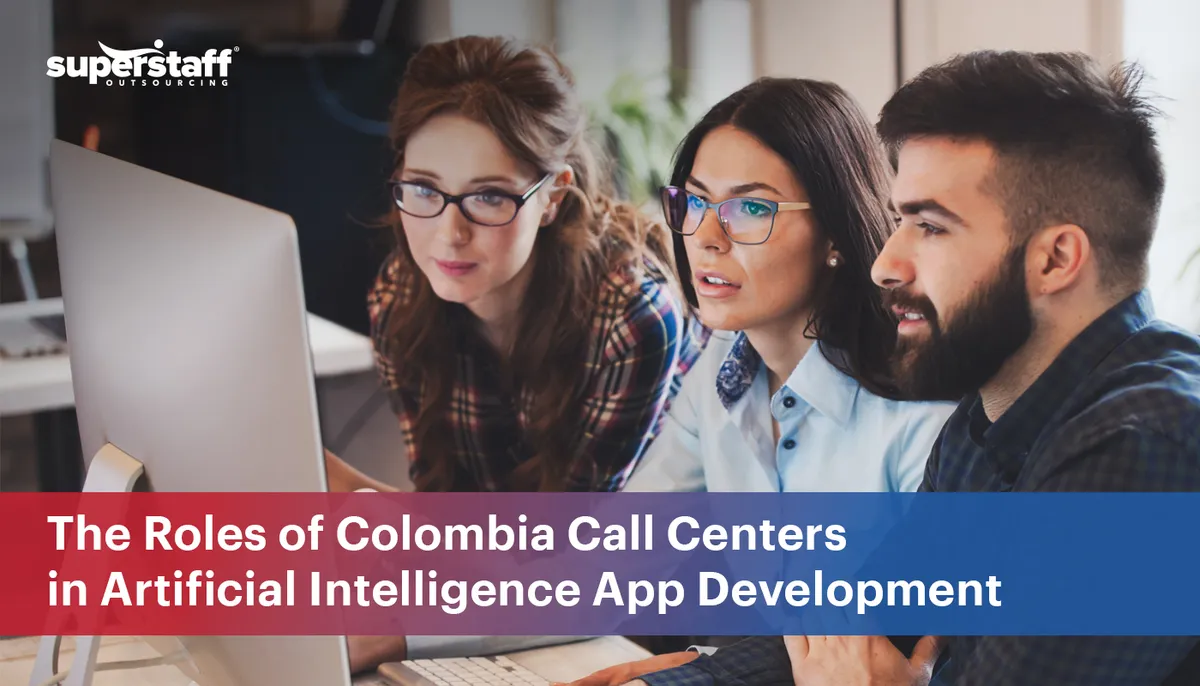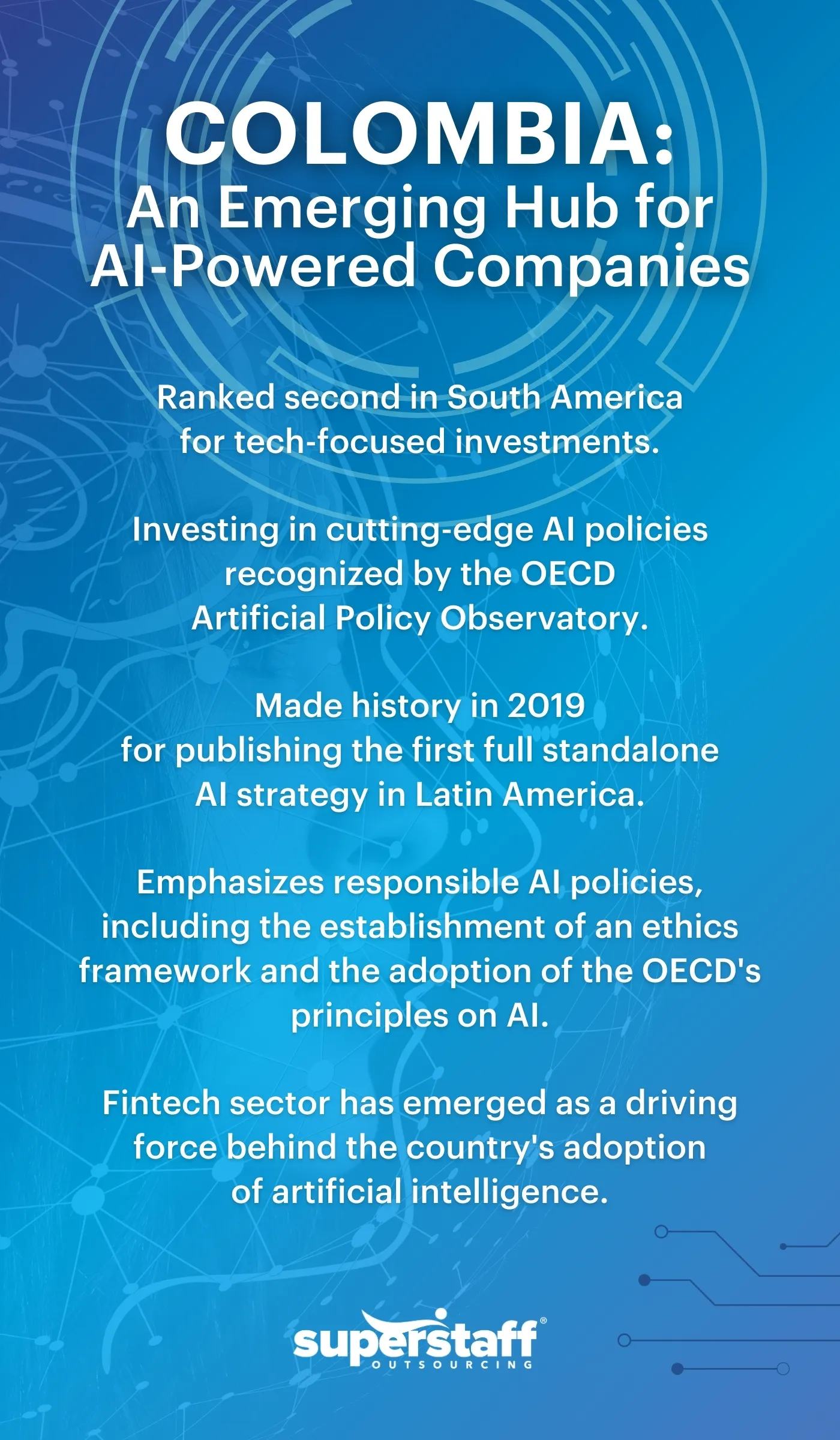
Over a decade, Artificial Intelligence (AI) has evolved from a niche interest to a focal point of global investment and political discourse. At the forefront of this digital revolution stands Latin America (LatAm).
The rise of AI in Latin America represents not just a technological advancement but a catalyst for progress and innovation. As the region navigates the complexities of the digital age, businesses can leverage Colombian call centers for an AI-fueled future powered by artificial intelligence apps and software that foster growth and empower communities.
Unlocking Colombia’s Potential: A Promising Incubator for AI-Driven Firms
The future looks promising for AI-driven firms in the country. With the country’s perfect mix of talent, resources, and support, Colombia stands to make significant contributions to the advancement of AI innovation on the global stage.

2nd in Tech-Focused Investments
Ranked second in South America for tech-focused investments, Colombia is a prominent destination for businesses seeking to capitalize on cutting-edge technologies. The country has strategically positioned itself as an incubator for AI-driven firms through high-level coordination efforts.
Out of $4 billion invested in tech ventures across the region in 2020, a hefty US$469 million was funneled to the country. This substantial influx of investment underscores the growing global confidence in Colombia’s potential as a thriving ecosystem for technology innovation.
AI-Friendly Policies
Since 2018, Colombia has been investing in cutting-edge AI policies. These efforts have been recognized by the OECD Artificial Policy Observatory, highlighting Colombia’s leadership in spearheading AI initiatives across the region, ranging from promoting AI adoption in the public sector to creating tools like a dashboard for ethical AI principles.
- National Policy for Digital Transformation and Artificial Intelligence
In November 2019, Colombia took a significant step forward in its digital transformation journey by issuing the National Policy for Digital Transformation and Artificial Intelligence. This strategic initiative underscores the government’s commitment to harnessing the power of technology, particularly AI, to drive innovation and growth.
- AI Experts Mission
Furthermore, the country established an AI Experts Mission tasked with providing specialized technical guidance to the government. It aims to help shape policies and strategies related to the development and implementation of AI across various sectors.
- Regulatory Sandboxes
Colombia’s forward-thinking strategy includes the implementation of regulatory sandboxes, a pivotal approach aimed at fostering innovation and experimentation in the AI sector. These sandboxes provide a controlled environment where businesses can test new AI technologies and business models under relaxed regulatory conditions, allowing for rapid iteration and refinement.
- AI Ethics Framework
The country is also proactively developing a national AI ethics framework to guide the responsible and ethical use of AI technologies. Additionally, Colombia is establishing robust standards to ensure the inclusiveness of AI implementation.
- AI Task Force
Colombia’s commitment to fostering responsible AI innovation is further underscored by establishing an AI Task Force. This specialized group is entrusted with a multifaceted mandate to shape the ethical and regulatory landscape surrounding AI development and deployment.
One of the primary functions of the task force is to propose technical guidelines and evidence to inform the development of regulatory proposals in the AI domain. Conducting a thorough analysis of existing regulations impacting AI design and development ensures that new policies are informed by evidence-based insights and aligned with international best practices.
Pioneered Standalone AI Strategies in the Region
In 2019, Colombia made history by publishing the first full standalone AI strategy in Latin America, joining the ranks of global economic powerhouses such as the UAE, Canada, China, and Singapore. In contrast, slightly behind early adopters like France, the UK, South Korea, and the EU, Colombia’s proactive approach demonstrates its commitment to harnessing the transformative potential of AI.
Moreover, Colombia has set another milestone by publishing the region’s first standalone AI ethics framework, further solidifying its leadership in responsible AI development. The country’s trailblazing efforts in AI strategy and ethics cement its place as a frontrunner in driving innovation and shaping the future of Latin America.
Holistic Strategy
Unlike other countries in the region, Colombia’s holistic strategy focuses on stimulating uptake, strengthening AI-related human capital, and implementing frameworks to mitigate potential risks.
But what truly sets Colombia apart is its explicit emphasis on responsible AI policies, including establishing an ethics framework and adopting the OECD’s principles on AI. Prioritizing responsible development alongside efforts to promote adoption and build capacity, Colombia has laid the groundwork for a sustainable and inclusive AI ecosystem that fosters innovation while safeguarding against potential risks.
AI-Driven Fintech Sector
Colombia’s fintech sector has emerged as a driving force behind the country’s adoption of artificial intelligence (AI). One notable example is MO Tecnologias, a fintech company leveraging AI and machine learning to bridge the gap between traditional and digital banks. Through its platform, MO Tecnologias connects unbanked consumers with financial institutions and offers alternative credit scoring, streamlining the loan application process and expanding access to financial services.
Furthermore, Colombia-based RappiPay has revolutionized customer experience by harnessing AI to analyze vast amounts of consumer data. RappiPay has significantly improved customer engagement and conversion rates by leveraging AI-driven language personalization in its marketing efforts. This innovative use of AI underscores Colombia’s commitment to leveraging cutting-edge technologies to enhance financial inclusion and drive economic growth.
AI and Machine Learning Support Roles You Can Outsource To Colombia Call Centers
Colombian call centers play a critical role in driving the adoption of AI technologies across various industries. As hubs of customer interaction and data collection, call centers are fertile ground for integrating AI solutions to optimize your business operations.
They help you stay at the forefront of innovation, driving business transformation and unlocking new opportunities for growth and efficiency. From data labeling and annotation to machine learning research, here’s a rundown of why you should outsource artificial intelligence services.
- Data Labeling and Annotation
AI-powered customer service is not the only way a call center or contact center helps advance AI development.
One of the primary functions of call centers in AI adoption is data labeling. Following date entry, service providers meticulously label data points, categorizing them based on various attributes such as sentiment, intent, and topic. This labeled data is then used to train AI algorithms, enabling machines to understand and respond to customer questions more accurately and efficiently.
In addition to data labeling, a call center also contributes to data annotation. This process involves adding metadata or tags to labeled data to provide context and enhance its usefulness for AI training. Annotations such as timestamps, speaker identification, and conversation summaries enrich the labeled data, making it more valuable for training AI models for speech recognition and natural language understanding tasks.
Furthermore, support agents play a critical role in ensuring the quality and accuracy of labeled data through rigorous quality assurance processes. Service providers review and validate the labeled data, correcting any errors or inconsistencies to maintain the integrity of the dataset, leading to more reliable and effective outcomes.
- Prompt Engineering
Prompt engineering is an AI technique for refining large language models (LLMs) and improving generative services. It helps tailor LLMs for specific tasks using examples and data sets, enhancing their performance. This technique is crucial for various applications, including robotic process automation bots, 3D assets, scripts, etc.
Among the key benefits of outsourcing is access to a diverse talent pool with expertise in prompt engineering. Whether organizations require assistance refining natural language processing (NLP) models, generating 3D assets, or developing robotic process automation (RPA) bots, outsourcing partners can provide tailored solutions to meet specific needs.
Outsourcing also allows companies to scale their prompt engineering initiatives more efficiently by leveraging external resources as needed, without the overhead costs associated with hiring and training internal teams.
Tapping into the expertise of external partners helps reduce costs and achieve their computer vision objectives more effectively in today’s data-driven business landscape.
- Python Development
Python, a widely utilized programming language, is renowned for its versatility in building websites and software applications, automating tasks, and conducting data analysis. As a general-purpose language, Python offers flexibility across a wide range of applications without being specialized for any specific problem domain. Its beginner-friendly syntax has contributed to its widespread adoption, making it one of the most popular programming languages today.
According to the 2022 Developer Survey, Python ranks as the fourth most popular programming language, with nearly half of the respondents reporting its frequent use in their development projects.
Outsourcing Python development offers several benefits for organizations looking to harness the power of Python for their projects and initiatives. From accessing specialized expertise and cost savings to faster time-to-market and scalability, outsourcing enables organizations to navigate complex development challenges and AI goals confidently.
- Machine Learning Engineer
Machine learning (ML) engineering is a specialized field focusing on designing, building, and deploying machine learning systems at scale. It involves applying computer science, statistics, and mathematics principles to develop algorithms and models that can learn from data and make predictions or decisions without being explicitly programmed.
ML engineers work on various stages of the deep learning lifecycle, from data collection and preprocessing to evaluation and deployment. They collaborate with data scientists, software engineers, and domain experts to translate business requirements into machine-learning solutions, optimize model performance, and integrate machine-learning systems into production environments.
Outsourcing ML engineers can accelerate project timelines and shorten time-to-market for ML-powered solutions. With dedicated teams focused on project delivery, outsourcing partners can expedite development processes, minimize bottlenecks, and ensure the timely deployment of ML systems. This agility is critical in competitive markets where speed-to-market can determine the success or failure of new initiatives.
- Artificial Intelligence Architect
The demand for AI architects continues to grow with the AI landscape. With their expertise in information technology, computer programming, and software design, these tech architects are instrumental in conceptualizing and executing AI solutions.
AI architects are responsible for developing AI systems that tackle diverse challenges. They leverage their deep understanding of AI algorithms and frameworks to serve as critical conduits, facilitating seamless collaboration between data scientists, engineers, and developers to ensure the smooth operation of their solutions.
Outsourcing artificial intelligence architects offers flexibility and scalability, allowing organizations to adjust their resources based on project needs and timelines. Whether scaling up to meet increased demand or scaling down during periods of reduced activity, outsourcing partners can quickly adapt team sizes and allocations to align with evolving requirements. This flexibility enables organizations to optimize resource utilization and maintain agility in response to changing business conditions.
- Data Scientists
In today’s data-driven world, businesses across all industries recognize the value of harnessing data to drive informed decision-making and gain a competitive edge. Data scientists play a pivotal role in this process, utilizing advanced analytics and machine learning techniques to extract insights from complex datasets.
However, building and maintaining an in-house team of data scientists can be challenging and costly for many companies. Outsourcing data scientists offers a strategic solution with numerous benefits in such cases.
Building and maintaining an in-house team of data scientists requires significant investment in recruitment, training, and infrastructure. Leveraging outsourcing services empowers companies to access top-tier talent at competitive rates without the overhead costs of hiring and retaining internal employees. Additionally, outsourcing allows organizations to pay for services project-by-project, optimizing resource utilization and minimizing fixed expenses.
- NLP Engineers
Natural language processing (NLP) is an interdisciplinary field that draws from computer science, information sciences, artificial intelligence (AI), and linguistics. It is primarily concerned with the interaction between computers and human languages.
While computers demonstrate proficiency in handling structured datasets, they encounter challenges when processing human languages. With hundreds of languages and dialects, each with its own grammar rules, slang, terms, and syntax, computers require assistance understanding and interpreting natural language.
NLP is the answer if you’ve ever wondered how platforms like Google, Alexa, and AI-powered chatbots function. NLP engineers develop programming that enables technology to effectively process and analyze natural language data, ultimately improving customer communication.
Outsourced NLP engineers have extensive experience working on various NLP projects across multiple industries, bringing valuable insights and best practices. Tapping into their specialized expertise allows organizations to accelerate their NLP initiatives and overcome complex linguistic challenges.
- Robotic Scientists
A robotic scientist has expertise in various fields, such as robotics, artificial intelligence, mechatronics, computer science, and engineering. They create innovative robotic solutions for multiple applications, including manufacturing, healthcare, agriculture, exploration, and more. These scientists are involved in all stages of the robotic system lifecycle, from conceptualization and design to prototyping, testing, and deployment.
Robotic scientists often collaborate with multidisciplinary teams to integrate advanced technologies and algorithms into robotic platforms to increase their functionality, autonomy, and performance.
Outsourcing robotic scientists helps businesses leverage a diverse talent pool of specialized robotics, artificial intelligence, and mechatronics professionals without the overhead costs of maintaining an in-house team. This approach offers flexibility and scalability, enabling organizations to adjust resources according to project needs.
- Computer Vision Engineer
Computer vision engineers specialize in developing and implementing computer vision systems and applications. Computer vision is a field of artificial intelligence and computer science that enables computers to interpret and understand visual information from the real world, such as images and videos.
These engineers use techniques such as image processing, pattern recognition, machine learning, and deep learning to design algorithms and models to analyze and extract meaningful insights from visual data. These insights can be used for various applications, including object detection, image classification, facial recognition, medical imaging, autonomous vehicles, and augmented reality.
Computer vision engineers typically work on all stages of the computer vision pipeline, from data collection and preprocessing to algorithm development, training, testing, and deployment.
They collaborate with multidisciplinary teams, including data scientists, software engineers, and domain experts, to create innovative solutions that leverage the power of visual data to solve real-world problems and enhance human-machine interactions.
Visual data is increasingly significant in various industries, from retail and healthcare to manufacturing and autonomous vehicles. However, developing and implementing computer vision solutions requires specialized expertise and resources that may not be readily available in-house. The answer lies in outsourcing.
Tapping into the expertise of external partners helps reduce costs and achieve their computer vision objectives more effectively in today’s data-driven business landscape.
- ML Researcher
ML researchers work on advancing the theory and practice of machine learning, exploring new methodologies, algorithms, and applications to solve complex problems across various domains. They typically have statistical modeling, optimization, neural networks, deep learning, reinforcement learning, and data mining expertise.
ML researchers typically work in academia, research institutions, or industry labs, collaborating with multidisciplinary teams to push the boundaries of machine learning and drive innovation in AI-powered solutions. Their contributions are crucial in advancing the state-of-the-art in machine learning and shaping the future of artificial intelligence.
In the competitive ML landscape, the talent pool in the Western market is quickly draining, prompting industry leaders to explore alternative solutions. Outsourcing machine learning projects to other countries has become an increasingly attractive option for many.
Fortunately, some providers offer access to top-tier machine learning experts, making the process fast and seamless. This opportunity helps businesses tap into a global talent pool and secure the expertise to drive their machine-learning initiatives forward.
Supercharge Your Artificial Intelligence App Development in Colombia
Propel your AI initiatives to new heights with SuperStaff’s cutting-edge site in Medellin, Colombia’s thriving tech hub. Our team of skilled professionals is ready to supercharge your AI projects with expertise honed in one of Latin America’s most dynamic tech communities.
With SuperStaff as your partner, you’ll harness the power of AI innovation while tapping into the wealth of talent and resources available in Medellin’s vibrant tech ecosystem. Don’t miss the opportunity to unlock your AI potential with SuperStaff. Let’s revolutionize your business together!







